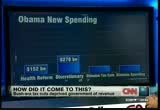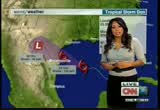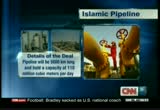tv World Business Today CNN July 29, 2011 1:00am-2:00am PDT
1:00 am
who will take care of them at a later stage of their life? a lot of good reasons to sit down and congress and take the bull by the horns and address the issue and come up with a solution. >> been a real pleasure. i'm zain verjee at cnn london. the gridlock ott capitol hill continues over the country's debt ceiling. last night republican house speaker john boehner was not able to get enough of his own party members to back his plan to raise the debt ceiling and reduce spending. house republicans say they're going to try again later today. that bill has no democratic support in the house and democrats have vowed to block
1:01 am
it. police in norway will interview anders breivik today. he's in solitary confinement in a prison near oslo. meanwhile police have called off the search for more victims of the shooting rampage on utoya island. 68 people were killed. a formal inquiry into britain's phone-hacking scandals began in london. a woman who worked with the now depuck news of the world tabloid after her daughter's murder now says her phone was hacked. sara payne had defended the tabloid, even writing the last edition, and calling it a force for good. there's been some break for the rain-soaked korean peninsula, and the clean-up is under way. huge tract ts of farmland are flooded in northee kra and about half a meet over rain poured down on the south korean capital in just 48 hours. at least 51 people died in
1:02 am
floods and mud slides. those are the headlines. i'm zain verjee, and "world business today" starts now. -- captions by vitac -- www.vitac.com a very good morning to you. from cnn london, i'm nina dos santos. >> and a very good afternoon to you from cnn hong kong. i'm manisha tank and it's friday, july 29. the deadlines get closer and closer. >> and while washington remains in deadlock, what do investors and analysts have to say? we hear from some of the experts. and if the u.s. does miss that deadline, the question is what happens? we'll be taking a look at the possibilities. so we're getting closer and closer, yet another day passes, and it's the same old story in washington. there's still no awe agreement
1:03 am
on reaching the debt celling and that leaves us just four days to go until the august 2nd deadline and a possible default. >> well, we thought we'd need to see progress late in washington. progress at least. inestate 10:00 p.m. local time the word came there wouldn't be a vote. republican house speaker john boehner failed to get enough support from his own caucus to bring his own debt ceiling plan to a vote. that plan would have raised the debt ceiling and cut spending but the ultimate conservative party, tea party, wants deeper cuts. >> the bill's not perfect. i never said it was perfect. nobody in my caucus believes it's perfect. but what this bill reflects is a sincere honest effort to end this crisis in a bipartisan way, to send it to the senate where it can receive action. >> john boehner there.
1:04 am
over in the senate, meanwhile, democrats say boehner's bill would have been dead on arrival anyway, and they're pushing a plan drawn up by senate majority leader harry reid. before the house republican leader threw in the towel on thursday night, reid had this to say. >> as soon as the house completes its vote tonight or this afternoon, the senate will move to take up that message that they sent to us. it will be defeated. they know that. the american people now should understand that clearly. >> having rejected boehner's bill, house republicans are due to meet in six hours' time to consider their options, nina. let's have a look at how this is affecting the markets, manisha. we're just a little over an hour into trading here in europe. a little over an hour. it is, yet again, another sea of red across these markets. et it's the fifth day of losses for many of these markets and the heaviest coming from the zurich smi line. moody's has placed aaa's
1:05 am
possible bond for a downgrade. they say a weak growth opportunities for the country were behind this decision. now, spain's ibex fell on the backes of the news. it's currently trading down by more than 1%. that's the ibex 35 down 1.2% trading at 9543. coming back to the united king dorjs british sky broadcasting or bskyb has reported earnings of $2.28 billion, beating expectations. it it also announced it will be buying back shares and into v-- investors with were pleased with this. let's check out the markets in asia. they closed out the week with the same story we've been telling almost every day. down, down, down again.
1:06 am
ramy inocencio has the forecast. >> they fell about seven-tenth of a percent. on top of washington's deadline, earnings report from the electronics sector did not help very much. share prices from nintendo and sony both fell after they unexpectedly slashed their forecast. that's because gaming devices as well as demands for tvs has been pretty week. in hong kong the hang seng fell about the two-thirds percent. its share price jump fourth degree%. over in the mainland the shanghai composite ended down about a quarter of a per senn. petrochina and xinhua both fell 1 and a half to two percent.
1:07 am
they expect fuel price earnings to level off. and then down under to the asx 200. well, they ended almost 1% lower because of washington's impact. but mining stocks with big drags here. we have rio tinto. financials fell. >> you know, ramy, we've been so preoccupied by what's happened in washington that sometimes it's easy to lose sight of the fact we are in the midst of earnings seasons. we've had reports across the region. >> nintendo, they slashed their full year's forecast earnings by a whopping 82%. that's because gamers aren't so interested in their handheld 3-d game players which came out five months ago. that would be the 3-ds. that's the biggest fall in the past two decades. you're looking at a year to date.
1:08 am
nintendo share prices dropped a whopping 47%. it's a similar story, not so bad for sony. they cut its profit estimate for the year by about 25%. this was yesterday. that's because of weak demand for tvs like this bravia over in the u.s. and europe. sony's share price year to date has also dropped by about 35%. but, you know, it's not all doom and gloom. they say its net income surged to about $1.31 billion. this is for the six months to may. forecasters had been -- forecast had been for earnings for about $1.09 billion. so that was a bit of good news that led to the jump in share price. but in the aviation world, a bit of turbulence. this is for singapore airlineses. they missed its first quarter estimate. yesterday they reported an 82% fall in net income for april to june period. that's because of high fuel costs and flat demand that were responsible for that. >> ramy, thanks very much for
1:09 am
that round-up. u.s. stocks ended down for a fifth session in a row on thursday, as well, of course, as the debt deadline continues to loom. al son kosik wraps it up on wall street. >> job claims and pending home sales boosted trade but ongoing worries over the debt, dow lost 52 points. the nasdaq gain 1 point. shares of exxon mobil. they post add second quarter profit or more than $10 billion but that was actually less than what analysts were expecting. it also increased spending on natural gas exploration by almost 60% as it gears up to meet future demand. strong aerngs trample pled
1:10 am
expectation expectations. for the first time. green mountain is the dominant player in the sing f-serve coffee brewer market. it said sales of single cusp rose more than a half. green mountain shares have tripled in value since july and analysts say there's still room for more gains. >> coming up friday, the much anticipated first reading of second quarter gdp is due out. analysts expect that it grew at a very slow pace last quarter. many call for a growth estimate of less than 2%. that's a wrap for the day on wall street. i'm alison kosik in new york. coming up on "world business today," as the u.s. debt deadline gets a close-up, we'll bring you three fresh perspectives on a deadlock that's become a debacle. tinted s with scientifically proven soy complex and natural minerals. give you sheer coverage instantly, then go on to even skin tone in four weeks.
1:13 am
then go on to even skin tone in four weeks. any questions? no. you know... ♪ we're not magicians ♪ we can't read your mind ♪ ♪ read your mind ♪ we need your questions ♪ each and every kind ♪ every kind ♪ will this react with my other medicine? ♪ ♪ hey, what are all these tests even for? ♪ ♪ questions are the answer ♪ yeah ♪ oh hello and welcome back.
1:14 am
from cnn london and hong kong, you're watching "world business today." of course, all eyes are on washington as they have been for days and weeks now. the fact is no one knows for she sure what will happen if the u.s. defaults. we spoke with three experts with their dpin ger on the pls. jim rogers, stephen roach, and d dick bove. first let's hear from jim rogers. speaking to me earlier on, he had some harsh words for the ratings agencies when i asked him whether the u.s. could lose its aaa credit rating. >> first of all, in the real world, it has moved. anybody who knows about economics knows that the u.s. is no longer a aaa credit. now, yes, moody's and standard & poor's didn't seem to know that but moody's and
1:15 am
standard & poor said they were a aaa until they went bankrupt. >> the question is where should investors put their money? >> i think you'll make more money in other commodities like silver or rice or natural gas, some of the things that are down. certainly you've got to own real assets because all over the world central banks are printing money and whenever they print it. real assets are the way to protect yourself. >> okay. so jim rogers believes the u.s. has lost its aaa rating already. guess what? he's not alone. morgan stanley's stephen roach agreed. >> there's already been a downgrade. one of the ratings agencies, it's beside the point. i think most serious investors
1:16 am
wlrks they happen to be sovereign governments from overseas or institutional investors don't look at u.s. treasury denominated paper with the same sense of security that they used to. they just don't truss washington to come up with a legitimate deal, even if there's a televised press conference where they all congratulate themselves in dodging the proverbial bullet. >> so if serious investors view the u.s. is already having suffered a downgrade, why haven't the markets tanked? well the banking analyst bove says people aren't taking it at all seriously. >> at the moment, everybody thinks this is just a big political gain and everybody thinks that by august 2nd, you know, some deal will be reached and everything thinks that we'll go on as we did before. and as a result of that, we're not seeing any major movement in treasury yields, we're not seeing any movement in corporate
1:17 am
yields. and the stock market, i would say, is doing reasonably well. once it dawns on investors that there is a serious problem here and that it is not being resolved, i think it will be a shock to the markets. i thunk you will see interest rates rise meaningfully in the private sector. i think treasury rates will start to go up, and i think you will see a setback in the stock market which could be relatively significant. >> three very interesting opinions there on the situation. four and a half trillion, that's how much u.s. debt foreign nations hold, and they're watching congress with considerable consternation. we'll take a look at who holds that debt and see why one asian economist says it looks familiar.
1:20 am
hello and welcome back. you're watching "world business today" live on cnn. it's not just the american investors worried about possible defaulting on its own obligations. more than 35 countries collectively hold more than $4.5 trillion worth of debt. china is the biggest hold efer of u.s. treasuries with almost $1.16 trillion worth. japan is second with more than $192 billion invested. other securities investors include the uk, brazil, and various oil exporting nations. finance officials in many of those countries aren't just
1:21 am
worried. they're also angry. china released a strongly worded commentary saying, quote, the well being of many other countries are also in the impact zone here. but as international correspondent stan grant reports china is too heavily invested in the united states to be able to cut and run. >> reporter: china is flush with cash. it has the highest foreign currency reserves in the world. it needs to put that money somewhere. at the moment, a big bulk of that is invested in u.s. treasuries. so that raises concerns here about a potential debt default if the u.s. would wipe off the lot of china's investment. there are concerns that china may, in fact, pull out of its u.s. reserves. but you have to think again about that. speak to most analysts and i'll tell you one thing. beijing rule has realized it may
1:22 am
not like it, but for now they're stuck with the u.s. >> they really can't sell too many treasuries without impacting the price of all the treasuries that they'd still be holding. they really -- there aren't that many other markets that are as deep or as liquid as treasuries. in fact, there are none. so when they accumulate reserves, this is really the only place they can put them. >> >> reporter: so despite fears of a default and the fierce china has, there's a harsh reality. china exports, if they want to keep the currency low, it has the a lot of cash in reserve and they have to put the money somewhere. it's tied in the united states. in the words of one analyst, china's policy, buy, hold, and grumble. stan grant, cnn, beijing. so just how angry are cry sneeze leaders at the united states right now? let's hear from once again from morgan stanley's agent stephen
1:23 am
roach. >> they're pretty appalled at this drama that's played out in washington right now. i've had various senior officials in china, as recently as ten days ago, tell me they really think the recklessness of the united states government is irresponsible and bordering on wreaking great havoc in the broader global economy. >> stephen roach there. the japanese are worried as well. not only because they're the second biggest holders of u.s. debt. 15 years ago japanese politicians waged their own battle arguing fiercely over spending cuts and tax hikes. as one economist kyung lah, he's got an overwhelming sense of deja vu. >> reporter: a standoff, a political dubai that seems unwilling to close, history
1:24 am
repeating itself. he has a pointed view about the current battle in washington from living through a similar debate in japan a decade ago. >> it's an exact replay of what we went through in japan 10 15rks years ago because i think u.s. got the same exact disease we caught ten, 15 years ago. >> reporter: march 1996, japanese politicians gridlocked in an ugly and devicist debate over government bailouts. opposition leaders had sit-ins. japan's economy was still recovering from its real estate assets bubble bursting just like the u.s. in the wake of the subprime cry sichls japan's private sector was minimizing debt, not maximizing profit because its balance sheeting were under water just like the u.s. today. japan's bunt deficit sky rocketed, and a year after the bailouts, the government turned to what they believed was the real economic problem, the
1:25 am
deficit. do you see this as deja vu? >> shockingly so. playing with the default, this is basically a bluff, right? i think it's a really dangerous game to play. as an american citizen who lived through the japanese experience the last 20 years, this is really sad to see u.s. making exact same mistake that japan made in 1997. >> reporter: in 1997 japan's prime minister reduced government bore ohhing and raised sale taxes in an effort to cut the deficit. what followed? six quarters of negative growth and recession, a continued meltdown in the banking system, and japanese economy that today still remains in stagnation. calm heads and sound economic policy, whatever the u.s. decides, must rise above the rancor in washington warns koo or they could follow in japan's muddy economic footsteps. >> they're working hard to reduce the budget deficit but they're doing it at the worst
1:26 am
moment in u.s. history. >> reporter: the big difference between the japan of the '90s and the u.s. of today is the impact on the rest of the planet. the u.s. is the world's largest economic power. so a default or overall economic slide spells bad news just for america but for the rest of the global economy. kyung lah, cnn, tokyo. now, if you want to comment on any of these stories on the show, getny touch with the whole of the wbt team on the facebook page go. to facebook.com/cnnwbt and let us know your thoughts. >> up next we'll get to the bottom of its origins and see who's to blame for america's blowout budget. that's negts. with your mortgage, worried about foreclosure. we can help you keep your house. all we ask for in return is that you submit
1:27 am
1:30 am
> from cnn london, i'm nina dos santos. >> and i'm manisha tank from cnn hong kong. a warm welcome back to "world business today." >> these are our top stories this hour. the clock is still ticking as the u.s. congress has yet to vote on raising the country's debt ceiling. republican house speaker couldn't muster enough votes from his own party to pass his plan. democrats on the o'hand who control the senate say they'll back their own plan. if a deal isn't done, the u.s. will pit its bore ohhing limit and will technically default on tuesday. moody's says that it's reviewing whether to downgrade
1:31 am
spanish downgrade. right now spain has an aa rating. a formal inquiry into britain's phone-hacking is under investigation and there are shocking details. a woman now says her own phone was hacked. sara payne had written in the tabloid in the latest edition defending their reputation. let's get back to our main story. the u.s. debt deadlock. let's take a look at how much money the united states could have if congress doesn't raise that debt ceiling on august 2nd. the think tank at the bipartisan policy center was founded by some of washington's most influential. these include howard baker as well as this man. he's the former senate majority leader, tom daschle. he's a democrat. their research suggests the united states actually has enough revenue for the month of august to pay the interest on
1:32 am
its debts and to stave off a default. but here comes the key bit. the country would have to slash spending radically. let's crunch the numbers now. the united states is likely to get about 170 to $3.2 billion in federal tax revenues in the month of august. what it has to do is balance it against this amount. this is about $306.7 billion worth of as yet unauthorized spending. to get to those two figures, what you have to do is cut spending by no less than 44%. then if we move along and take a look at exactly where the cuts may come, this is what you see. as you can see, the united states will have to be spending about $29 billion on interest to make sure that it keeps that costed aaa rating. it will have to pay the interest on its bonds to form a default and next comes the next big check.
1:33 am
we've got social security amounting to no less than $42.9 billion in total. next is medicare and medicaid. those are no less than 50 billion dollars. then troops andive service and veterans programs. those together make up about $5.9 billion. that in turn leaves you with $39 billion to divide between departments that normally get about $172 billion worth of funding and these include all sorts of important things such as defense contractor, tax refunders, foorksd education and as you can see it's a significant amount of money. it looks like monopoly money. you know, manisha, the stakes couldn't be higher. i try to answer this question. can the u.s. survive without a debt ceiling not by words of politicians but numbers torque let the numbers speak for themselves, manisha. >> yeah, they certainly do,
1:34 am
don't they? nina, thank you. so how did the u.s. get to this point? there's more to the country's money problems than meets the eye. john vause explains. >> how is it they buy themselves more than $14 trillion in debt, especially in 2000 when president clinton led the white house the federal government was, in fact, lending a surplice. there's been a lot of spending. this is the spending are of george w. bush from 2002 to 2009. there were benefit medicate program, prescription drugs, the t.a.r.p., essentially when they when out and bought subprime mortgages and the like. there was discretionary expenditu expenditures. president bush had his own still laws program back in 2008 when the global financial crisis hit. all of this is small until you get to the big decrease in
1:35 am
defense spending. this also includes two wars, one in iraq and one in afghanistan and keep in mind, this, of course, was post-9/11. nothing, though, compares to the bush tax cuts have had on the federal budget. how does this compare to barack obama? well, we're looking at projected spending here from 2009 all the way to 2017. there is president obama's health care package, obama care, $152 billion there. discretion nair extendy tear, stimulus tax cuts, just over $425 billion and barack obama had his own stimulus package, just over $700 billion. let's look at the two grand totals here. president bush, a grand total of over $5 billion, president obama about $1.5 trillion. what this says is, yes, both
1:36 am
presidents spent a lot of money over a long period of time but this crisis has been years in the making. >> that's one of the criticisms that many on washington have been receiving. we saw this coming. >> now it's time for a spot of weather and it's not looking like a great weekend for us in asia. in fact, if winds were howling around our building. i believe it has a lot do with the tropical storm system that's passing by here and going off. >> it's known as nock-ten. nock-ten has been producing some strong winds right along the coastline of china. in the last couple of hours you've seen wind gusts up to 35 through parts of hong kong. if you look at what's happening, tropical storm, nock-ten, located 2 x 00 kilometers south-southwest of hong kong to give you an idea. you can see where it is. the moisture, the rain spreading in hainan island. i want to point out to you.
1:37 am
the winds are 102 kilometers. the winds are going to be the big story. it's really going to be the heavy rainfall. nonetheless as we go 24 hours out, nock-ten reforms and comes right back out into the gulf of tom kin and goes to the west and is going to make its third landfall along the coastline of vietnam with winds right around 56 kph. again, that's going to be to the south of hanoi. they're coming up. 40 kph. hong kong at 30. hanoi, 13. let's go to a live shot out of hong kong to. give you an idea, clouds around. things are looking a little bit better. of course, that storm system moving away. the weather will improve. but as i take you over to the graphic, we're going to be dealing with extremely heavy rainfall as i said. anywhere you're seeing in red as well as this orange right here, tangerine, we're talking 75 meters of rachblt we'll see it
1:38 am
in areas including parts of vietnam as we go through today as well as tomorrow. we can't forget tropical storm don. it's moving through the gulf of mexico. 500 kilometers southeast of corpus christi. it's going to continue to move through the gulf of mexico today and then as we head into late friday as well as into saturday, we are going to see tropical storm don making landfall, looks like in the southern part of texas, not far away potentially from brownsville and corpus christi. notice the winds will briefly peak around 102 kilometers. it's going to be bringing badly need moisture for parts of the southwest. we're talking parts of mexico as well as texas. that leads me to my next story. are you a fan of ice cream? well, maybe you should head on out to washington, d.c., capitol hill. they are giving away free ice cream. this is a company.
1:39 am
they said, hey, they have no problem giving away ice cream to democrats, republicans, tea party member, anyone, as long as they are not involved -- get this, manisha -- in negotiating the debt deal. if you're not involved, you're hot, you've got a sweet tooth, hecht on over to capitol hill. you just can't be involved in the budget deal. we're included. we get free ice cream. we just need to fly to d.c. >> frankly at the rate they're going they're going to need the ice cream. they're going to need the sugar rush to get to august 2nd. >> they're all going to need it while they negotiate. >> jennifer, stay with us here, because manisha, jennifer, i want to bring you up to date on something u funny i found. it's friday. let's give a little bit of humor. it's been giving some of the political commentators and talk show hosts and comedians quite a
1:40 am
bit of fodder for their jokes over the past couple of days. as some may know president obama will be celebrating his 50th birthday in an expensive gala bash one day after the august 2nd deadline. this is what conan o'brien has to say about it. he says president obama may have to cancel his own 50th birthday party. he says the republicans won't even let him raise his age limit. there you have it. >> who ever wants to raise, that right? >> yeah. i mean -- >> there are disastrous consequences for the market, at least he doesn't get to get old sneer everybody deserves a birthday celebration, especially a 506789 maybe a smaller more economically friendly one. >> jennifer delgado, many thanks for that. let's take a last look at the markets and see how they're being affected by this ongoing
1:41 am
debacle surrounding the debt in the united states. we're two hours into the trading session or almost. and as you can see, another day of red right across the board. really heavy losses across the cac 40. also the dax. one thing i should point out is people are becoming increasingly curbed about euro debt zone once again after one of the ratings agencies placed the spanish ratings on review for a possible downgrade. well, in asia the u.s. debt debacle did manage to weigh in on the sector. you can see we had the asx s&p in australia down by about about nine-tenths of 1%. >> but we are looking forward, aren't we, to what's going go happening on wall street. u.s. stocks ended down for the fifth session in a row on thursday. but this is how your futures are looking on friday.
1:42 am
it's not looking good, is it. we're down by more than half a percent apiece for the down industrial. we'll keep an eye on all of this for you as the day goes on. but we or going to see you again a little bit later, but for now that's it for this edition of "world business today." i'm manisha tank in hong kong. >> and i'm nina dos santos at cnn in london. we're going to be heading you over toally velshi who's coming up soon and in the meantime "marketplace middle east" will be coming up next.
1:45 am
announcer: when life's this hard, it's no wonder 7,000 students drop out every school day. visit boostup.org and help kids in your community stay in school. middle east," the creation of an islamic poois pipeline. iran announces the region's biggest ever gas deep. we count the cost of the turmoil in an exclusive interview with the country's finance minister. iran signed a $10 billion memorandum of understanding with iraq and syria this week in the
1:46 am
region's biggest ever natural gas deal. he calls for gas from iran to be exported by pipeline through iraq to sear yaus and even lebanon and it could eventually supply europe. i sat down with a veteran in the oil and gas industry who outlined how the project is expanding the region's energy role. >> from an economic and business point of view, you don't have the gas resources, and iraq itself needs it. iraq's own gas sources are not surfacing for at least the next 10, 20 years until they develop. the gas is being discovered in europe. syria, libya and so on need the gas and europe needs the gas. not to rely so much on russian gas. >> let's take look at some of figures behind us. according to some of the most recent data, the u.s. sits on 25%. iran has the second largest reserves just after russia.
1:47 am
that counts for at least 16% of the world's tote achlt you know the story here. iran has been almost a pariah in the energies business. the majors can't touch it because of the sanctions that are in place, european majors stay out of it. will this deal help break that stranglehold on the market? >> i think. so this is a good example for say that business principle should override political situations. political problems are short term. >> so let's see the details of this islamic pipeline that's being called. the length of the pipeline is expected to be more than 5,000 kilometers with a capacity of 110 cubic meters of gas a day. iraq says it needs 10 to 15 of gas. 15 to 20 and lebanon, 5 to 7 million until 2020. there's also hope that iranian gas will be transmitted to the european countries including greece, but can that happen under this sort of political environmental in your view? will russia let a deal go like this and come through?
1:48 am
is there that much demand to fulfill both the russian natural gas, the pipelines that are coming from central asia, and the iranian gas to europe? >> all the discussions, as you go through there, a few years ago they said they did not need the gas. but more and more as realls of product and other areas becoming clearering they say that they do need another source. and, you know, it's a natural one. and think this principle would override all those political views and concentration. >> we had one test case, if you will, the so-called peace pipeline, iran-pakistan-india. the u.s. state department stood up and said, this is not going to happen. does it go through anyway as a litmus test? >> i think what was unfortunate is the problem between india and pakistan, that they didn't want -- on continuedian side to rely on the gas on going through pakistan. they thought maybe it should be
1:49 am
offshore and so on. i think as far as iran and pakistan is concerned or the two are concerned, the deal is going quite a long way ahead on the iranian side. on the pakistani side there is so many announcements. of course, over 20 years, announcements are announcements, but they seem a bit more serious. >> pipeline politics indeed. it's become a major source of contention between lebanon and israel. they're warning israel to stay away from the country's energy resources but leaders of the hezbollah group calls on them for an energy exploration. maritime dispute over who owns what are escalating already heightened tensions between two countries. we take a special look. >> reporter: under the warm waters of the mediterranean may lie treasures yet unknown.
1:50 am
reservoirs of black gold. the u.s. geological survey estimated that this part of the eastern mediterranean could hold nearly 2 billion barrels of recoverable oil and huge reserves of gas. in these watt ears behind me lies what may be the savior for lebanon's ailing economy and fields of gas and oil, a discovery that may draw a new era for a country historically struck by political and economic problems. he is excited by the prospects. >> the prospects that we have are spread all over the exclusive economic zone where we have a high potential of gas and oil fields. >> but in this region. potential comes with problems because lebanon and israel can't
1:51 am
agree on the invisible line in the sea that would mark their maritime border. >> reporter: it's significantly further south than the line israel is further proposing. it also conflicts with the line we have agreed upon with cypress. and what is more significant in my eyes, it conflicts with the line that lebanon itself agreed to with cyprus in 2007. >> reporter: not so according to lebanon. the 857 kilometers of deep blue water belong to them. >> so what was said that the mistake has been made, a different agreement was signed by them. we are respecting the international lows and if israel would do the same, there would be no problem. >> reporter: israel has already begun selling exploration rights for two natural gas fields,
1:52 am
tamar and here which together could hold 25 trillion cubic feet of gas. lebanon is years behind explores its gas fields. they have approved a bill regulating oil and gas exploration, but the government may not issue any licences until late next year. an oil bonanza won't remake this country just yet. for "marketplace middle east," rima maktabi, beruit, lebanon. >> the foreign ministry says it's open to dialogue with lebanon and wants to settle the disagreement peacefully. counting the cost of war in libya, around $50 billion and counting according to d country's finance minister. an exclusive interview with gadhafi's government when we come back.
1:55 am
joo as fighting continues in . as fighting continues in libya, germany announces it will contribute money. they need $3 billion over the next few months alone. from the region qatar has donated. earlier this year kuwait offered $177 million to the war-torn country, but how much is fight costing the country's economy now? the gadhafi government says the impact is, quote/unquote, colossal. and the export of gas has play add major part in that as ivan watson found out as he sat down with the country's finance minister. >> the economy was moving at a rate of 7% to 8% growth. then it immediately stops. and this is the stoppage of so
1:56 am
many projects that were financed by the oil revenues. all of these came into the -- into the framework of a development plan. a project worth about $117 billion. the income was gone because of the export. it's something like $20 billion. and if you put some more damages to the infrastructure over an amount which is equivalent to that so in five, six months you're talking about $50 billion worth of losses. >> here you were perched on the mediterranean, so close to the european markets. you have pristine beaches, you have vast amounts of oil and natural gas. was there a dubai model, some kind of economic model that you were hoping for libya?
1:57 am
>> when oil is depleted in a number of years, then the economy should have enough capacity to manage itself and to create income. most of the financial rekwiermts for these projects are being frozen in international banks and financial institutions. >> this was your piggy bank. this was supposed to get you to build your economy beyond oil, and now most of it appears to have been frozen by foreign government. >> there is a request by the -- this temporary consul larkt benghazi, that they should be allowed to use the frozen funds if you are freezing.
1:58 am
funds for the country. then you can't confiscate it. >> once again, ivan watson in tripoli with libya's finance minister. let's take a look at some of the other headlines impacting the region this past week. dubai's leader has appointed a new governor for the dubai international financial center. the emirates banking has taken over the reins right away. egypt this week successfully got back into the international bond market for the first time since the revolution earlier this year. egypts ministry of finance raised over half a billion dollars by selling two-year notes. the coupon rate was 112.1%. for more about the program visit our website, cnn.com/mme or send your e-mail to us. check out arabic.cnn.com/mme. that's it for this edition of cnn "marketplace middle east."
353 Views
Uploaded by TV Archive on

 Live Music Archive
Live Music Archive Librivox Free Audio
Librivox Free Audio Metropolitan Museum
Metropolitan Museum Cleveland Museum of Art
Cleveland Museum of Art Internet Arcade
Internet Arcade Console Living Room
Console Living Room Books to Borrow
Books to Borrow Open Library
Open Library TV News
TV News Understanding 9/11
Understanding 9/11





























































